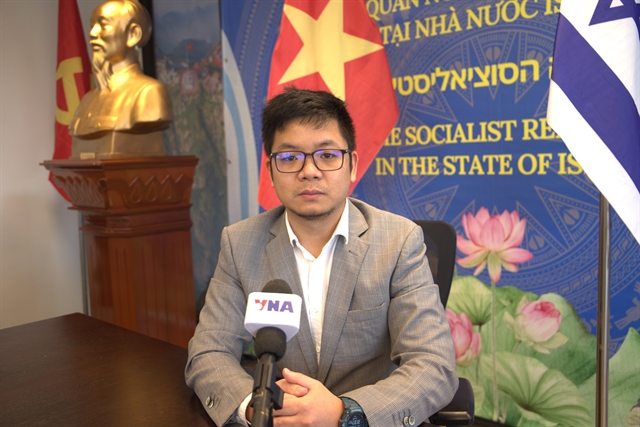 Society
Society

A volunteer nurse in the northern province of Bắc Ninh has devoted 30 years of her life to care for leprosy patients, earning the affection and respect from those with the ‘cursed disease’ who were shunned by society.
99555202PM.jpg) |
| Nurse Nguyễn Thị Xuân helps an elderly leper patient into her bed. — VNA/VNS Photo Lê Phú |
BẮC NINH — A volunteer nurse in the northern province of Bắc Ninh has devoted 30 years of her life to care for leprosy patients, earning the affection and respect from those with the ‘cursed disease’ who were shunned by society.
The Quả Cam Leper House, a solitary facility in a corner of Bắc Ninh Leprosy and Dermatology Hospital Centre, is home to over 80 elders with leprosy who are receiving treatment and being cared for as they can no longer do everyday tasks unaided.
“Sister Xuân” is the affectionate name the patients have dubbed Nguyễn Thị Xuân, who in 1987 gave up her job as a kindergarten teacher to spend her life caring for these unfortunate people, which was deemed an “insane” decision at that time when leprosy was still highly stigmatised in Vietnamese society.
“During the church sermons I attended, the priest often spoke about the patients, who I always felt sorry for. I came across a book titled Lạc quan trên miền thượng (Optimism on the highlands) about a French catholic who left his comfortable life to come to Lâm Đồng Province to build the Di Linh Leper House,” Xuân said. “The story stuck in my mind, and I constantly wondered why a young man from a faraway country came all the way to Việt Nam, but did not choose to live in big cities but instead a Central Highland province to help those people while I had done nothing.”
And that was how her attachment with leprosy started. During the time when she was still teaching at the kindergarten, every weekend, Xuân volunteered at Quả Cam learning everything she could about the disease and how to help ease the suffering of the patients.
“It was really heartbreaking to see the lepers suffering from ulcerative wounds. Many of them had lost their arms or legs when the disease advanced,” Xuân said. “Some of the older patients were all alone and had never been visited by their children.”
The first indelible impression that Xuân encountered was the sight of an 84-year-old man with late-stage leprosy lying in a corner just waiting to die. On his deathbed, all he wished for was a chance to meet his daughters and sons and his grandchildren for the last time, but it never happened.
“I pitied him but I didn’t know what to do aside from consoling him. One week later, when I returned, he passed away. Never in my life had I witnessed such a sad funeral, no crying relatives, no white veils. Only a few patients, struggling with movement themselves, brought him to his final resting place at the foot of the mountain,” Xuân said.
This story turned out to be an ‘epiphany’ for Xuân, who then decided to give up everything and defy her family’s objections to commit her life to caring for leprosy patients full-time.
“I just felt that it was my calling; there are so many patients in need of support. At the beginning, seeing how closely I cared for the patients and how I did not shy away from touching them, the leader of the house even asked me if I was not scared of catching the disease from them? I told him they were like my parents so I didn’t flinch from them like other people did. I know the disease is really not that easily spread,” Xuân said.
After a period of volunteering, the house leader signed her up for a medical training course in Bình Định Province and she became an official nurse at Quả Cam after she finished the course in 1992.
Watching people struggling with daily activities because their arms and legs had been eaten away by the disease, in 1992 Xuân asked the house to send her on a training course on how to make wooden prosthetic arms and legs, as well as specialised shoes to make it easier for the patients to move around with dignity, instead of crawling around as before.
Xuân is also considered a “skilful matchmaker” who has successfully brought happiness to many couples living in the home, while she never thought much of her own happiness.
She remains unmarried but she said she’s never felt lonely because she regarded the leper house as her home, and all the patients and workers there her family members.
Hoàng Thị Các, a patient of Quả Cam who has suffered from leprosy since she was 20 and has been living an isolated life there for more than 60 years, even composed a song for Xuân to thank her for her dedication and affection.
Despite reaching retirement age in 2012, Xuân asked to remain at the house, saying that she was still healthy enough to continue her work.
“Their love for me gives me the strength I need. I will not rest until my hands can no longer pour a cup of water for the patients here. Maybe I was blessed by a higher power. I’ve never been sick for more than half a day,” Xuân said.
“To simply be here, doing the job I love in the presence of those I care deeply about, gives me the greatest contentment I could have,” she said. — VNS




